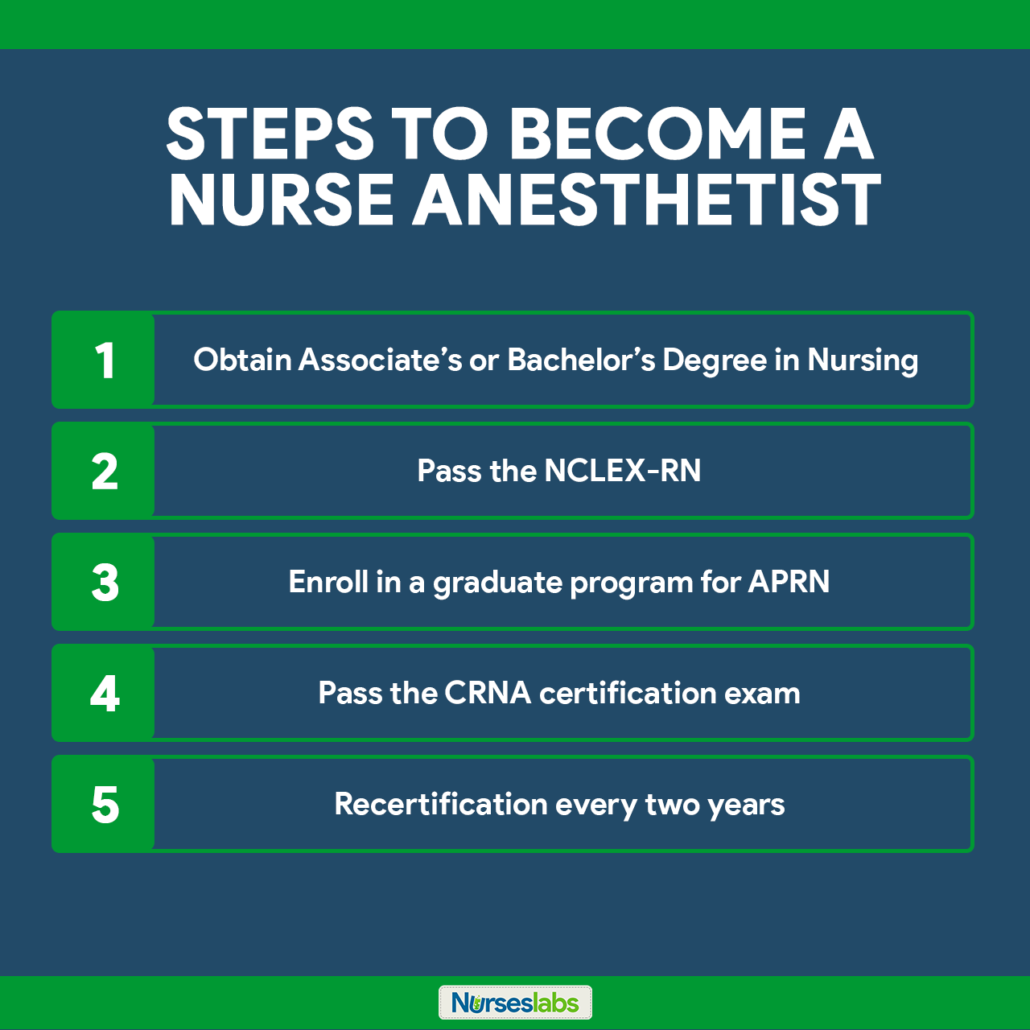Discover the role and significance of a Certified Registered Nurse Anesthetist (CRNA) in healthcare. Learn about the educational requirements, career outlook, and the transition options available for CRNAs. Explore the differences between CRNAs and anesthesiologists, and gain insights into their roles and responsibilities.
Who is a Certified Registered Nurse Anesthetist (CRNA)?

A Certified Registered Nurse Anesthetist (CRNA) is a highly skilled and specialized advanced practice nurse who holds a master’s or doctoral degree in nurse anesthesia. CRNAs play a critical role in the healthcare system by administering anesthesia to patients undergoing surgical, obstetrical, and other medical procedures. They possess a unique combination of nursing expertise and advanced knowledge in anesthesia, allowing them to provide safe and effective anesthesia care. Additionally, CRNAs collaborate with surgeons, physicians, and other healthcare professionals to ensure optimal patient outcomes.
How Long Does it take to become a Certified Registered Nurse Anesthetist (CRNA)?
Becoming a Certified Registered Nurse Anesthetist (CRNA) involves a comprehensive educational journey. Typically, individuals start by obtaining a bachelor’s degree in nursing, which takes approximately four years. Following this, they gain clinical experience as a registered nurse (RN) for at least one to two years. Subsequently, aspiring CRNAs enroll in a nurse anesthesia program, which can range from 24 to 36 months for a master’s degree or 36 to 48 months for a doctoral degree. Overall, the path to becoming a CRNA requires a commitment of approximately 7 to 9 years of education and clinical training beyond high school.
What does a Certified Registered Nurse Anesthetist (CRNA) do?
Certified Registered Nurse Anesthetists (CRNAs) are responsible for administering anesthesia to patients before, during, and after surgical procedures. They carefully assess patients’ medical histories, conduct pre-operative evaluations, and formulate individualized anesthesia care plans. During surgery, CRNAs closely monitor patients’ vital signs, adjusting anesthesia levels as needed to ensure their comfort and safety. Additionally, CRNAs manage pain relief after surgery and provide post-operative care, ensuring a smooth transition into the recovery phase. Their expertise extends to various medical settings, including operating rooms, labor and delivery units, and pain management clinics.
How to become a Certified Registered Nurse Anesthetist (CRNA).
To become a Certified Registered Nurse Anesthetist (CRNA), individuals must follow a structured educational and professional pathway. This typically includes:

- Obtain a Bachelor of Science in Nursing (BSN) degree: This involves a four-year undergraduate program focusing on nursing fundamentals and clinical practice.
- Gain clinical experience as a Registered Nurse (RN): After obtaining a BSN, aspiring CRNAs work as registered nurses to accumulate valuable clinical experience. This period typically lasts for at least one to two years.
- Pursue a Nurse Anesthesia Program: Applicants then enroll in an accredited nurse anesthesia program, which leads to a master’s or doctoral degree in nurse anesthesia. These programs provide intensive training in anesthesia principles, pharmacology, and clinical practice.
- Attain certification: Upon successful completion of a nurse anesthesia program, individuals are eligible to sit for the National Certification Examination (NCE) administered by the National Board of Certification and Recertification for Nurse Anesthetists (NBCRNA).
- Obtain state licensure: CRNAs must also obtain state licensure, which entails meeting specific licensing requirements set by the state’s board of nursing.
Educational Requirements for Certified Registered Nurse Anesthetist (CRNA).
The educational requirements for becoming a Certified Registered Nurse Anesthetist (CRNA) are rigorous and demanding. Aspiring CRNAs must hold a minimum of a Bachelor of Science in Nursing (BSN) degree, which typically takes four years to complete. Following this, individuals must gain clinical experience as a Registered Nurse (RN) for at least one to two years before applying to a nurse anesthesia program. These programs, which lead to a master’s or doctoral degree in nurse anesthesia, range from 24 to 48 months in duration, depending on the level of education pursued.
Certified Registered Nurse Anesthetist (CRNA) Certification and Exam Requirements.
Certification for CRNAs is administered by the National Board of Certification and Recertification for Nurse Anesthetists (NBCRNA). To become certified, candidates must successfully pass the National Certification Examination (NCE), a rigorous assessment that evaluates their knowledge and competence in anesthesia practice. Additionally, CRNAs are required to participate in continuing education and meet recertification requirements every four years to maintain their certification.
Where do Certified Registered Nurse Anesthetist (CRNA) work?
Certified Registered Nurse Anesthetists (CRNAs) are highly versatile healthcare professionals who work in a variety of settings. They can be found in operating rooms, surgical centers, labor and delivery units, pain management clinics, and even in dental offices. CRNAs also play a vital role in providing anesthesia services in rural and underserved areas, contributing to improved access to surgical care for diverse patient populations. Their expertise and skills make them an integral part of the healthcare team in various clinical environments.
What is the Certified Registered Nurse Anesthetist (CRNA) career outlook and career growth?
The career outlook for Certified Registered Nurse Anesthetists (CRNAs) is highly promising. Due to a growing demand for surgical and anesthesia services, CRNAs are expected to remain in high demand in the healthcare industry. With their advanced skills and expertise, CRNAs often enjoy a competitive salary and numerous opportunities for career advancement. Additionally, CRNAs have the option to specialize in areas such as pediatric anesthesia, obstetric anesthesia, and pain management, further expanding their career options.
What are the qualities of a Certified Registered Nurse Anesthetist (CRNA)?
Effective CRNAs possess a unique set of qualities that contribute to their success in the field. These include:

- Attention to Detail: CRNAs must meticulously monitor patients’ vital signs and adjust anesthesia levels as needed, requiring a keen eye for detail.
- Critical Thinking: They must be able to make quick, informed decisions in high-pressure situations to ensure patient safety and well-being.
- Communication Skills: CRNAs collaborate closely with surgeons, physicians, and other healthcare professionals, necessitating strong communication and teamwork abilities.
- Empathy and Compassion: Providing anesthesia involves addressing patients’ fears and concerns, making empathy and compassion essential qualities for CRNAs.
- Adaptability: CRNAs work in dynamic and ever-changing healthcare environments, requiring the ability to adapt to new technologies, procedures, and protocols.
What are the top Certified Registered Nurse Anesthetist (CRNA) programs?
Several reputable institutions offer top-notch Certified Registered Nurse Anesthetist (CRNA) programs. Some of the renowned programs include those offered by the University of Pittsburgh, Duke University, Case Western Reserve University, and the Mayo Clinic School of Health Sciences. These programs provide comprehensive education and clinical training, preparing graduates for successful careers as CRNAs.
Are there any online programs to becoming a Certified Registered Nurse Anesthetist (CRNA)?
While there are online resources and courses available to support the education of aspiring CRNAs, the majority of the formal education and clinical training required to become a Certified Registered Nurse Anesthetist (CRNA) must be completed in traditional, accredited in-person programs. This is due to the hands-on nature of anesthesia practice, which necessitates supervised clinical experiences and practical training in real healthcare settings.
What is the salary of a Certified Registered Nurse Anesthetist (CRNA)?

Certified Registered Nurse Anesthetists (CRNAs) are highly compensated for their specialized skills and critical role in patient care. As of 2022, the average annual salary for CRNAs in the United States ranges from $160,000 to $200,000, depending on factors such as location, years of experience, and specific practice setting.
How do Certified Registered Nurse Anesthetists (CRNAs) influence health care delivery?
CRNAs play a pivotal role in enhancing healthcare delivery by ensuring safe and effective anesthesia care. Their expertise allows for expanded access to surgical and procedural services, particularly in underserved and rural areas where physician anesthesiologists may be less available. Additionally, CRNAs contribute to cost-effective healthcare delivery by providing high-quality anesthesia care while minimizing resource utilization.
How do Certified Registered Nurse Anesthetists (CRNAs) transition to other nursing positions?
Certified Registered Nurse Anesthetists (CRNAs) have the option to transition to various other nursing positions if they choose to explore different aspects of healthcare. Some common transitions include roles in education, research, healthcare administration, or specialized nursing practice areas. With their advanced training and clinical experience, CRNAs bring valuable skills and knowledge to any nursing role they choose to pursue.
What’s the difference between a CRNA (nurse anesthetist) and an anesthesiologist?
While both Certified Registered Nurse Anesthetists (CRNAs) and anesthesiologists are crucial members of the anesthesia care team, there are notable differences between their education and training paths. Anesthesiologists are medical doctors who undergo a comprehensive medical education, followed by a specialized residency in anesthesiology. They have a broader scope of medical training, which includes the ability to diagnose and manage complex medical conditions.
On the other hand, CRNAs are advanced practice nurses with a background in nursing, holding either a master’s or doctoral degree in nurse anesthesia. They receive specialized education in anesthesia care, focusing on the administration of anesthesia and perioperative management.
While both CRNAs and anesthesiologists are qualified to administer anesthesia and provide anesthesia care, their distinct educational backgrounds may influence their approach to patient care and their roles within the anesthesia care team.
Certified Registered Nurse Anesthetist (CRNA) Roles and Responsibilities.
Certified Registered Nurse Anesthetists (CRNAs) have a wide range of roles and responsibilities within the healthcare setting. These include:
- Preoperative Assessment: Conducting thorough patient assessments, including medical history, physical examination, and any relevant diagnostic tests, to formulate an individualized anesthesia care plan.
- Anesthesia Administration: Administering various types of anesthesia, including general, regional, and local anesthesia, and ensuring patients are safely and effectively sedated during surgical procedures.
- Intraoperative Monitoring: Monitoring vital signs, fluid balance, and other physiological parameters throughout surgery, making necessary adjustments to anesthesia levels to maintain patient stability.
- Postoperative Care: Providing immediate postoperative care, including pain management, monitoring recovery, and ensuring a smooth transition to the recovery phase.
- Pain Management: Utilizing their expertise to manage acute and chronic pain in various clinical settings, such as pain management clinics and palliative care.
- Collaboration and Communication: Collaborating with surgeons, physicians, nurses, and other healthcare professionals to ensure coordinated and comprehensive patient care.
- Emergency Response: Being prepared to handle emergencies and critical situations, including airway management, resuscitation, and stabilization of patients in distress.
- Patient Advocacy: Advocating for patients’ safety, comfort, and well-being throughout the perioperative period, ensuring they receive the highest standard of care.
Conclusion:
Certified Registered Nurse Anesthetists (CRNAs) play an indispensable role in the healthcare system, providing safe and effective anesthesia care to patients undergoing surgical and medical procedures. With their advanced education, clinical training, and specialized skills, CRNAs contribute significantly to the success of surgical interventions and pain management. As the demand for surgical services continues to grow, the outlook for CRNAs remains promising, offering a fulfilling and rewarding career path in the field of anesthesia care. Their dedication to patient safety, coupled with their commitment to excellence, solidifies their position as valued members of the healthcare team.
Frequently Asked Questions
- What’s the fastest you can become a CRNA?
The fastest path to becoming a Certified Registered Nurse Anesthetist (CRNA) typically takes about seven years. This includes earning a Bachelor of Science in Nursing (BSN), gaining one to two years of clinical experience as a Registered Nurse (RN), and completing a nurse anesthesia program, which can range from 24 to 48 months depending on the level of education pursued.
- What is the highest paid CRNA salary?
As of 2022, the highest paid CRNAs can earn upwards of $200,000 annually. This figure can vary based on factors such as years of experience, specific practice setting, and geographical location.
- What is the lowest paid CRNA?
The lowest paid CRNAs typically earn around $140,000 per year. However, it’s important to note that salary can vary depending on factors like experience, location, and practice setting.
- What is the easiest CRNA school in the US?
It’s important to understand that becoming a CRNA requires rigorous education and training, and no accredited program is considered “easy.” Each program is designed to provide comprehensive training to ensure CRNAs are well-prepared for their critical role in healthcare. Aspiring CRNAs should focus on finding a program that aligns with their educational and career goals.
- Which state pays CRNA the most?
As of 2022, states with higher costs of living and in-demand healthcare services tend to offer higher salaries for CRNAs. States like California, New York, and Texas are known for offering some of the highest salaries for CRNAs.
- How long are most CRNA programs?
Most CRNA programs range from 24 to 48 months in duration, depending on the level of education pursued. Programs leading to a master’s degree typically take 24 to 36 months, while doctoral programs may extend to 36 to 48 months.

